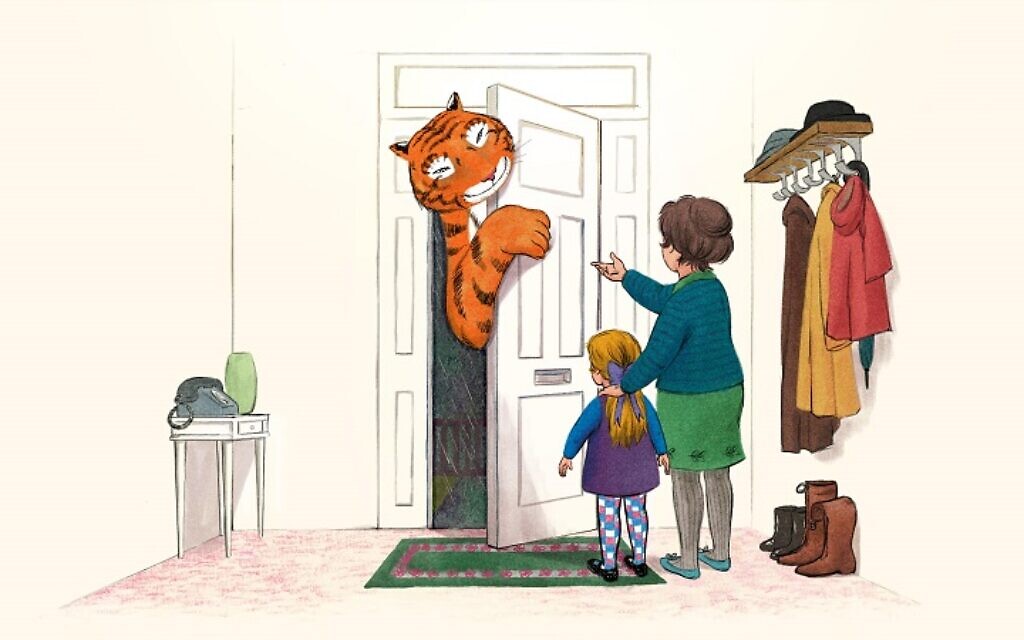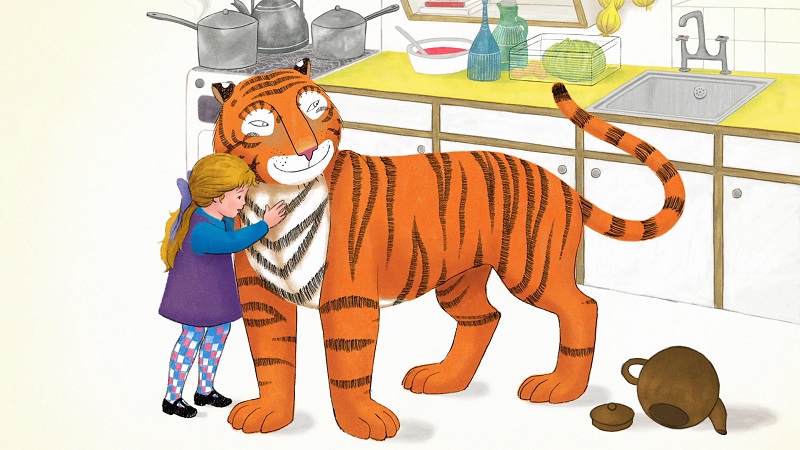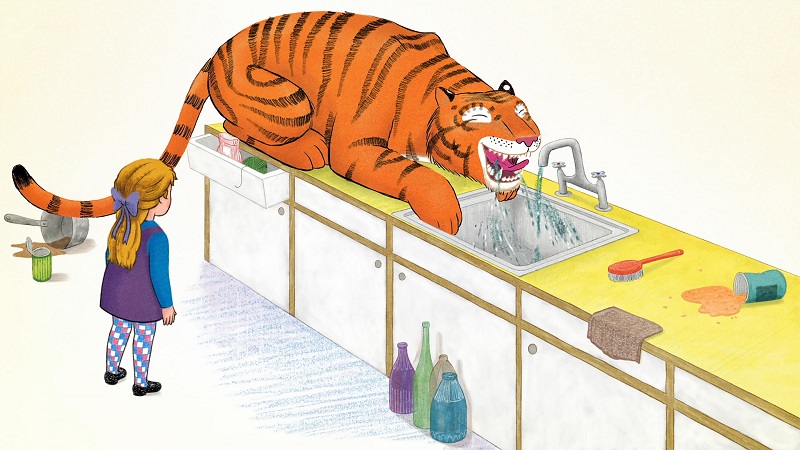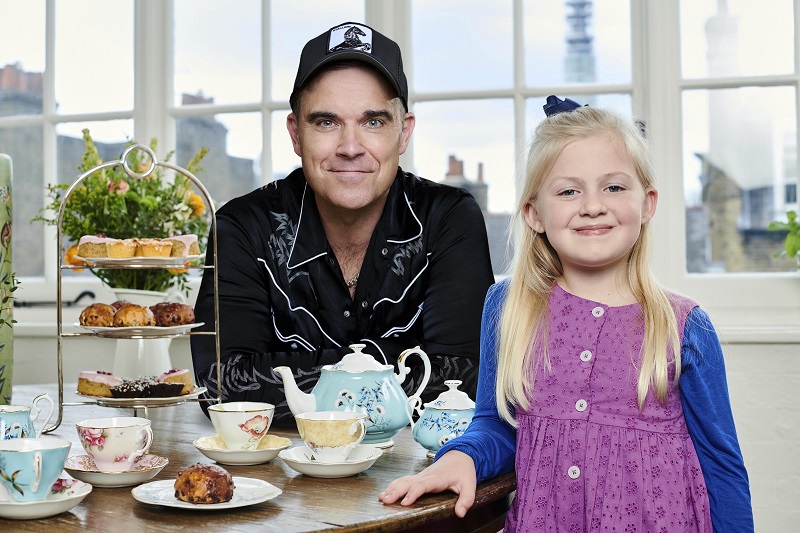Judith Kerr’s The Tiger Who Came To Tea ‘was always about fun, not Nazis’
Lupus Films' sumptuous animation of the beloved children's book airs on Channel 4 on Christmas Eve and Christmas Day

For readers of any age, Judith Kerr’s beloved tale, The Tiger Who Came To Tea, presents a curious, if not tantalising puzzle that has lasted more than 50 years.
In short, a little girl named Sophie sits down to enjoy afternoon tea and cake with her mother when there’s a sudden ring at the door. Sophie’s mummy says, “I wonder who that can be…?”
Never could the pair have imagined it would be a large tiger, or a tea-guzzling tiger, who steps inside and literally eats every last crumb of food and drinks every last drop of drink the family possess. And then he abruptly leaves.
Get The Jewish News Daily Edition by email and never miss our top stories Free Sign Up
Years ago, children’s author Michael Rosen attempted to unravel the thread of this surprising tale by suggesting the tiger reflects Kerr’s experiences as a young child in Nazi Germany – but it was an assertion the writer herself always denied.
Writer and illustrator Kerr, also best known for her Mog series and her semi-autobiographical, When Hitler Stole Pink Rabbit, did however say the story about a tiger was simply just that – with all the joy and wonderment of having a tiger turning up unannounced at your house conjures up in a child’s imagination.
It was from that starting point that Ruth Fielding, producer and joint managing director of Lupus Films, approached Kerr and her publisher at Harper Collins to turn the book into a hand-drawn animation that stays faithful to the original story and illustrations – resulting in an enchanting 30-minute film set to air on 24 December, on Channel 4.
Kerr sadly passed away aged 95 earlier this year, but was involved in the entire process of producing the film, from adding comments on the script to helping choose the star-studded cast, which includes Friday Night Dinner actress Tamsin Greig as Mummy, Sherlock star Benedict Cumberbatch as Daddy and Selma actor David Oyelowo as Tiger.
They are joined by David Walliams as the narrator, Paul Whitehouse as the milkman and seven-year-old actress Clara Ross as Sophie.
Speaking about taking on the task of adapting one of Kerr’s most-loved books, which has charmed generations of readers since it was first published in 1968, Fielding says she felt “huge responsibility, but huge joy”.
She tells me: “The burden of responsibility is huge, but we weren’t worried because we had Judith’s help. She was involved right from the very beginning. She was involved in the script, she saw the design, was involved in choosing the cast – and even the lyrics for the song. We knew her views across the whole process.”
As for interpreting the meaning of the book, Fielding, who recalls repeatedly borrowing The Tiger Who Came To Tea from her local library as a young child herself, says she only looked to Kerr’s own explanation on this, having come up with the idea to entertain her young daughter, Tacy.


“Judith was very clear when she wrote it that she was home looking after a four-year-old girl and as such, you have to use all the power of imagination to entertain a young child. It’s about turning lemons into lemonade, being happy entertaining a little girl and imagining what might happen if a tiger came to tea.”
Director Robin Shaw equally reveals that he “didn’t have any interpretation of the book.”
“[The Tiger] is enough of a character not to have to read anything else into him. He just turns up, waltzes in, cheeky, but charming. He’s one of those people you admire, but also feel abused by at the same time, someone who can get what he wants without even having to ask for it, or try hard for it. You don’t need to put some deeper meaning into it – it’s just fun.”
Staying true to Kerr’s original intentions, the animation vivaciously bounces along thanks to the energetic, Henry Mancini-inspired music from composer David Arnold, including the standout song, Hey Tiger, co-written with lyricist Don Black and voiced by Robbie Williams.
The sumptuous hand-drawn animation – which would have taken one person 22.5 years to complete – are also in keeping with Kerr’s illustrations in the book, down to the white space framing the scenes.

Even the obvious anachronisms – such as the baker’s boy, the milk man and the 1960s fashions – are left untouched, even for today’s child who might be unfamiliar with such things.
“Although there are certain things very much of their time in the book and the film, the things that are most important in there are timeless,” says Shaw.
“You have a child’s imagination, a giant tiger and this relationship between Sophie and her mum, so there’s a lot for us to recognise and relate to, no matter what age you are.”
The Tiger Who Came To Tea airs on Channel 4 on Tuesday, 24 December at 7.30pm and is repeated on Wednesday, 25 December at 1.50pm.

Thank you for helping to make Jewish News the leading source of news and opinion for the UK Jewish community. Today we're asking for your invaluable help to continue putting our community first in everything we do.
For as little as £5 a month you can help sustain the vital work we do in celebrating and standing up for Jewish life in Britain.
Jewish News holds our community together and keeps us connected. Like a synagogue, it’s where people turn to feel part of something bigger. It also proudly shows the rest of Britain the vibrancy and rich culture of modern Jewish life.
You can make a quick and easy one-off or monthly contribution of £5, £10, £20 or any other sum you’re comfortable with.
100% of your donation will help us continue celebrating our community, in all its dynamic diversity...
Engaging
Being a community platform means so much more than producing a newspaper and website. One of our proudest roles is media partnering with our invaluable charities to amplify the outstanding work they do to help us all.
Celebrating
There’s no shortage of oys in the world but Jewish News takes every opportunity to celebrate the joys too, through projects like Night of Heroes, 40 Under 40 and other compelling countdowns that make the community kvell with pride.
Pioneering
In the first collaboration between media outlets from different faiths, Jewish News worked with British Muslim TV and Church Times to produce a list of young activists leading the way on interfaith understanding.
Campaigning
Royal Mail issued a stamp honouring Holocaust hero Sir Nicholas Winton after a Jewish News campaign attracted more than 100,000 backers. Jewish Newsalso produces special editions of the paper highlighting pressing issues including mental health and Holocaust remembrance.
Easy access
In an age when news is readily accessible, Jewish News provides high-quality content free online and offline, removing any financial barriers to connecting people.
Voice of our community to wider society
The Jewish News team regularly appears on TV, radio and on the pages of the national press to comment on stories about the Jewish community. Easy access to the paper on the streets of London also means Jewish News provides an invaluable window into the community for the country at large.
We hope you agree all this is worth preserving.
-
By Brigit Grant
-
By Laurent Vaughan - Senior Associate (Bishop & Sewell Solicitors)
-
By Laurent Vaughan - Senior Associate (Bishop & Sewell Solicitors)
-
By Laurent Vaughan - Senior Associate (Bishop & Sewell Solicitors)
-
By Laurent Vaughan - Senior Associate (Bishop & Sewell Solicitors)





















